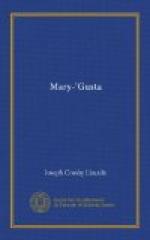She felt that she must write him, that he must know she had heard and was thinking of him. So, after leaving the store, she had hastened down to the house and up the back stairs to her room. There she had written a few lines, not more than a note, but the composing of that note had been a difficult task. There was so much she longed to say and so little she could say. When it was written she remembered that Crawford was in Boston and she did not know his address. She determined to send the letter to the Nevada home and trust to its being forwarded.
She took from the back of the drawer the box of photographs and looked them over. As she was doing so Isaiah called her to dinner. Then she heard her uncles come in and, because she felt that she could talk with no one just then, she avoided them by hastily going down the front stairs. She made a pretense of eating and left the house. Isaiah did not see her go. After stopping at the store long enough to tell Mr. Crocker she would be at the tea-room that afternoon, she climbed the hill, unlocked the door of the For’ard Lookout, entered and began her work.
The wind howled and whined and the rain beat against the windows. The blinds creaked, the sashes rattled, the gusts moaned in the chimney above the fireplace, and all the hundred and one groanings and wailings, the complaints of an old house in a storm, developed. All these sounds Mary heard absently, her mind upon her work. Then, little by little as they drew nearer, she became conscious of other sounds, footfalls; someone was coming up the walk.
She did not rise from her chair nor look up from her work when the outside door opened. Even when the footsteps sounded in the little hall behind her she did not turn.
“Yes, Uncle Shad,” she said. “I am here, and I’m safe and I’m perfectly dry. Also I’m very, very busy. Now, why did you come out in the rain to hunt me up? And I’m quite sure you haven’t put on your rubbers.”
And then the voice behind her said: “Mary.”
She turned now—turned, looked, and rose to her feet. Her face went white, then flushed red, and then paled again.
“Oh!” she gasped.
Crawford Smith was standing there. His light overcoat—it was not a raincoat—dripped water; so did the hat in his hand. He stood there and looked—and dripped.
“Mary,” he said again.
She caught her breath, almost with a sob.
“You!” she exclaimed. “You! Oh, how could you? Why did you come?”
He took a step toward her. “Because I felt that I must,” he said. “I had to come. I came to see you once more. You must forgive me.”
She did not speak. He continued:
“You must forgive me for coming,” he said again. “There was a question I had to ask and only you could answer it. It isn’t the question I asked before, although perhaps that—But first I must tell you: Mary, my father is dead.”




